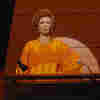
Sandie (Anya Taylor-Joy) and Eloise (Thomasin McKenzie) merge minds, bodies and fashion senses in Previous Night in Soho.
Parisa Taghizadeh/Target Featuers
conceal caption
toggle caption
Parisa Taghizadeh/Emphasis Featuers

Sandie (Anya Taylor-Pleasure) and Eloise (Thomasin McKenzie) merge minds, bodies and vogue senses in Previous Night time in Soho.
Parisa Taghizadeh/Focus Featuers
Edgar Wright established out to make a trippy fever-desire of a motion picture. Last Night in Soho, the movie he has manufactured instead, is basically febrile: insistent, overworked, maddeningly repetitive and — like the most powerful fevers — by turns sweaty and chilly, and keenly uncomfortable to encounter.
His complex competencies remain on full exhibit, however, as he and his workforce painstakingly recreate the riot of shades, sounds and textures of ’60s London, dutifully reproduce the seem and come to feel of giallo filmmaking, and confidently pull off the illusion essential to the film’s self-consciously contrived premise.
In the existing day, a naïve and sweet compact-city woman named Eloise (Thomasin McKenzie), who is obsessed with the Swingin’ London scene of the 1960s, will get into the manner school of her goals, found in Soho. But she quickly becomes disillusioned, and moves out of the pupil housing wherever her sensitive mother nature is preyed upon by Necessarily mean Girls and Drunk Boys. She finds a flat steeped in a strange background involving the glamorous, groovy and formidable youthful nightclub singer Sandie (Anya Taylor-Joy). Each and every night time, in her goals, Eloise travels back in time to the 1960s in which she from time to time observes and from time to time inhabits Sandie, as the younger lady gets drawn into seedy, exploitative relationships with a series of males, like her supervisor Jack (Matt Smith).

As noted, Wright is a deft hand at staging the intelligent cinematic effect of Eloise and Sandie investing sites, utilizing both of those in-camera procedures and CGI to make just about every switch seem to be seamless and basically magical. The purpose Very last Night time in Soho feels as leaden and thuddingly repetitious as it does has absolutely nothing to do with the motion of his digital camera, which is a lot less specified to the showy speedy-cuts and whip-pans that marked his previously movies.
No, the film fails due to the fact its each and every character conquer, plot stage and narrative switch is telegraphed ten minutes in advance of it occurs onscreen — whereupon it proceeds to get underlined, boldfaced, all-capped and circled. Very long scenes of dialogue simply condition and re-point out (and on extra than one occasion, re-re-state) events we have just witnessed. A chase scene through the streets of London goes on eternally, and its motion only endlessly iterates, never ever escalates. (At a person stage late in the film, Eloise stumbles on a police station and decides to explain to authorities of the uncanny gatherings that have befallen her, at which stage this reviewer heard an exasperated sigh escape his lips, for the reason that I understood precisely — much much too specifically — how the subsequent five minutes of the film would participate in out. If it surprises you, reader, to master that the cops do not feel her tales of time journey, congratulations: You are the man or woman for whom that wildly avoidable scene was prepared and filmed.)

A groovy tune played at earsplitting quantity, on repeat
It will not assist that McKenzie — an actor who’s accomplished understated, nuanced function in films like Depart No Trace and Jojo Rabbit — is directed to vibrate at these types of a continually superior frequency through the movie. When we meet up with Eloise, she is cartoonishly sweet, extensive-eyed and naïve. Later, her encounters at manner college leave her cartoonishly anguished. Later still, the situations she witnesses in her travels through time result in her to spend the rest of the movie cartoonishly terrified, perpetually on the verge of tears. This preference leaves the character no spot to go, emotionally, with no arc to follow — she starts the film at 11, and stays there till the credits roll.
Probably the idea was for Eloise’s status as a raw, uncovered nerve to make her seem to be susceptible to us, and so sympathetic. But in execution, for the reason that the film is acquiring way much too a lot glib pleasurable casting her as a sufferer, the character only frustrates. She turns down generous gives of aid far too lots of times for it to make any form of remarkable feeling, anything the script — by Wright and Krysty Wilson-Cairns — thinks it can justify by making an attempt to increase the prospect of psychological illness in a clumsy, fifty percent-assed fashion that only succeeds in coming off as affordable, lazy and tone-deaf.
There is a kernel of a promising thought, beneath all this belabored self-indulgence. The notion of having one’s simplistic, perfectly-scrubbed ideas about the earlier challenged by harsh reality could make for film that has a thing to say about how we make, preserve and confront background — the lies we explain to ourselves about ourselves. But the film is so heavy-handed and self-satisfied that it delights in punishing Eloise for the criminal offense of — what, particularly? Nostalgia alone? Turning her back on her flawlessly repellent, deeply toxic schoolmates, whom she has just about every appropriate to want to steer clear of?

Which receives to the real situation — the movie’s hopelessly muddled feeling of intent. It is an keen riff on the leering sex and violence of the giallo subgenre, still it strives to place alone as a variety of feminist fable. That’s why it plays at such a uniformly broad, large-pitched emotional volume, and why it spends so a great deal time lingering above the abuse and exploitation of Sandie and other women in these an extreme, repetitive and gleefully lurid manner. As a end result, it ends up ogling the violence in opposition to women that it purports to maintain at arms’ duration.
This is all the much more mystifying, given that just about every of Wright’s former films is possessed of a specified indefatigable lightness, a nimble excellent to the storytelling that has practically nothing to do how speedy he moves his digital camera, and every thing to do with the twinkling, knowing feeling of playfulness they exude. Previous Evening in Soho, on the other hand, is a loud, depressing and irritatingly manipulative two-hour wallow.
